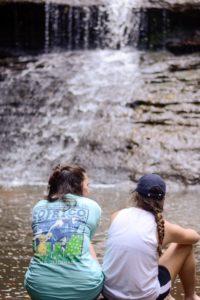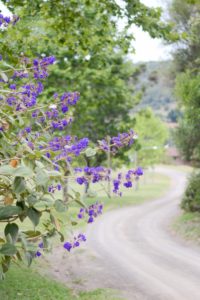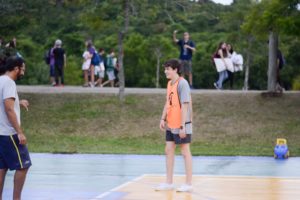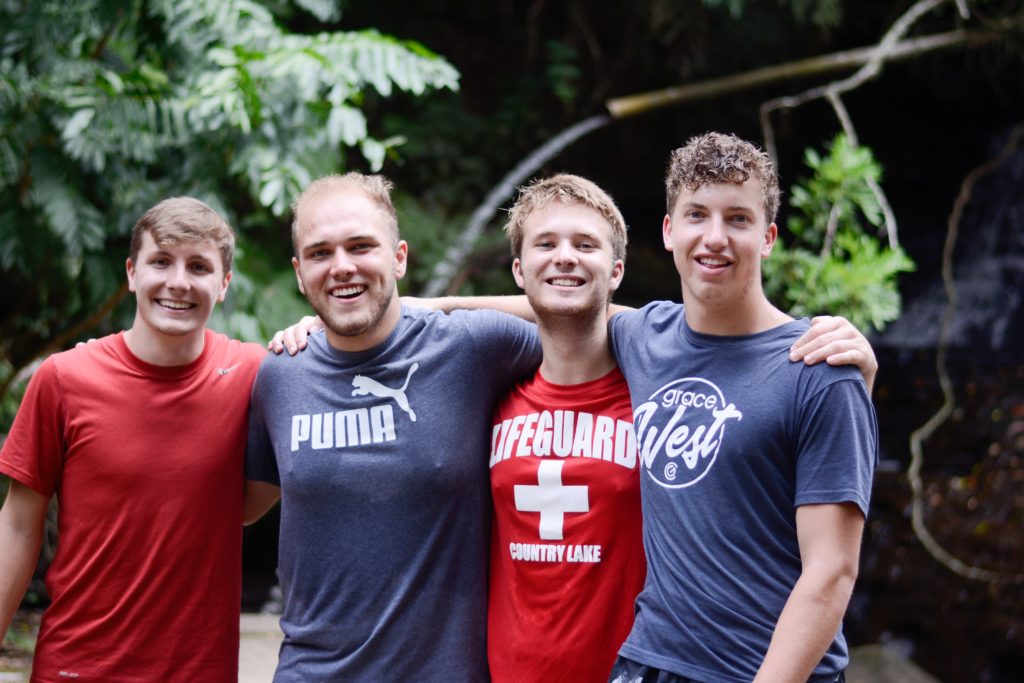The team of Porto Alegre is currently living alongside Brazilians in their culture learning much about servant leadership and how to love with actions, not just words. There is so much beauty in the opportunity to do life with people of different cultures.
 The first day of camp at Palavra Da Vida, a few members of the team walked the trail down to the waterfall to explore and cool off. What we found was a beautiful harbor of beauty and calm as the lush greenery creates a unique space of both adventure and calm. We sat under the rapid water and watched as butterflies flew around us and listened as birds called from surrounding trees.
The first day of camp at Palavra Da Vida, a few members of the team walked the trail down to the waterfall to explore and cool off. What we found was a beautiful harbor of beauty and calm as the lush greenery creates a unique space of both adventure and calm. We sat under the rapid water and watched as butterflies flew around us and listened as birds called from surrounding trees.
 It was in this beauty that we began to share our stories. I am coming to understand the weight of our stories and the power it holds when we tell them. It was a blessing to find the connections that brought all of us to the same place at the same time, creating a community of believers from around the world. God works beyond borders and language barriers and He is moving in his church body all the world. So often as American Christians, we forget that the Gospel is so much bigger than the small Christian bubble we dwell in. There is one uniting thread between all of us and that is the call Christ has on all of our lives.
It was in this beauty that we began to share our stories. I am coming to understand the weight of our stories and the power it holds when we tell them. It was a blessing to find the connections that brought all of us to the same place at the same time, creating a community of believers from around the world. God works beyond borders and language barriers and He is moving in his church body all the world. So often as American Christians, we forget that the Gospel is so much bigger than the small Christian bubble we dwell in. There is one uniting thread between all of us and that is the call Christ has on all of our lives.
 The love of God breaks through the divide that is naturally created with languages. As each team member finds their role within the camp, we are learning about servant leadership in a practical, yet challenging way. Many times one is surrounded by Portuguese without any way to understand or respond. In our tasks there is often confusion and mundane things that need to be done such as cleaning bathrooms, washing dishes, serving snacks, and planning events. All these jobs are behind the scene roles and create spaces to form relationships with the Brazilian staff in which we get to learn humility in how we go about serving.
The love of God breaks through the divide that is naturally created with languages. As each team member finds their role within the camp, we are learning about servant leadership in a practical, yet challenging way. Many times one is surrounded by Portuguese without any way to understand or respond. In our tasks there is often confusion and mundane things that need to be done such as cleaning bathrooms, washing dishes, serving snacks, and planning events. All these jobs are behind the scene roles and create spaces to form relationships with the Brazilian staff in which we get to learn humility in how we go about serving.
Often servant leadership doesn’t feel like leadership at all. Rather, it is doing something that appears to not hold much significance, with joy and obedience. Often we assign the definition of leadership to the question of who has the largest impact or the biggest stage rather than who is obeying God and leading people most effectively to Christ? Because of the language barrier, I am learning to find comfort in the fact that my serving behind the scenes is also influencing the Kingdom of God, providing a place and space for the people who do speak the language to love these campers well. Sometimes love is best displayed in action, not words. When we walk in obedience, God blesses what we do, despite the title of the job.
 I see the image of our God on his hands and knees, washing our feet. This picture reveals the servitude and humility Jesus embodied, as he washed the dirtiest parts of us so we could go forwards and share truth. It is here that I find myself on my hands and knees scrubbing floors asking the question, “Lord, how are you going to use me here?” In personal reflection, I find that the root of this question is assuming that I am higher than the position I have been placed in. Servitude and leadership is not about me but so others can see Christ through me. What part of my definition of serving has been made to be something it is not? How often do we chose to serve with the intention of gaining recognition or praise rather than out of a heart of love?
I see the image of our God on his hands and knees, washing our feet. This picture reveals the servitude and humility Jesus embodied, as he washed the dirtiest parts of us so we could go forwards and share truth. It is here that I find myself on my hands and knees scrubbing floors asking the question, “Lord, how are you going to use me here?” In personal reflection, I find that the root of this question is assuming that I am higher than the position I have been placed in. Servitude and leadership is not about me but so others can see Christ through me. What part of my definition of serving has been made to be something it is not? How often do we chose to serve with the intention of gaining recognition or praise rather than out of a heart of love?
So often the model of leadership and service is Jesus and his ministry on earth, however our natural tendencies are to adapt the comfortable qualities of his ministry and ignore the hard and unsettling moments where he leaned into the pain of loving others. We can chose to see the glory he received, the miracles preformed, or the times he outwitted the Pharisees while still missing the true parts of ministry where he sat with sinners and loved people who were deemed unloveable. He was spat upon, mocked, tempted and tested, and misunderstood. As his disciples, we are to serve with the heart of humility and love that God bestowed upon us. When we dwell in this love and look to Christ’s example, selfish intentions have no place. We are to be found living holistic lifestyles that reflect the Lord in everything we do whether it be in how we do dishes or share our testimonies on stage.
 Let us go therefore and wash other’s feet with the same love that Jesus has held for us. As we work alongside our fellow Brazilians, there is power in serving without recognition. Even though we may not directly see the impact of our camp roles, we must be willing to open our eyes to the greater eternal Kingdom work we are doing. This holistic Christian life we are learning about is being challenged and put into practice as we enter into the depths of a new culture and language and learn about how to love the world the way Jesus has called us to.
Let us go therefore and wash other’s feet with the same love that Jesus has held for us. As we work alongside our fellow Brazilians, there is power in serving without recognition. Even though we may not directly see the impact of our camp roles, we must be willing to open our eyes to the greater eternal Kingdom work we are doing. This holistic Christian life we are learning about is being challenged and put into practice as we enter into the depths of a new culture and language and learn about how to love the world the way Jesus has called us to.

